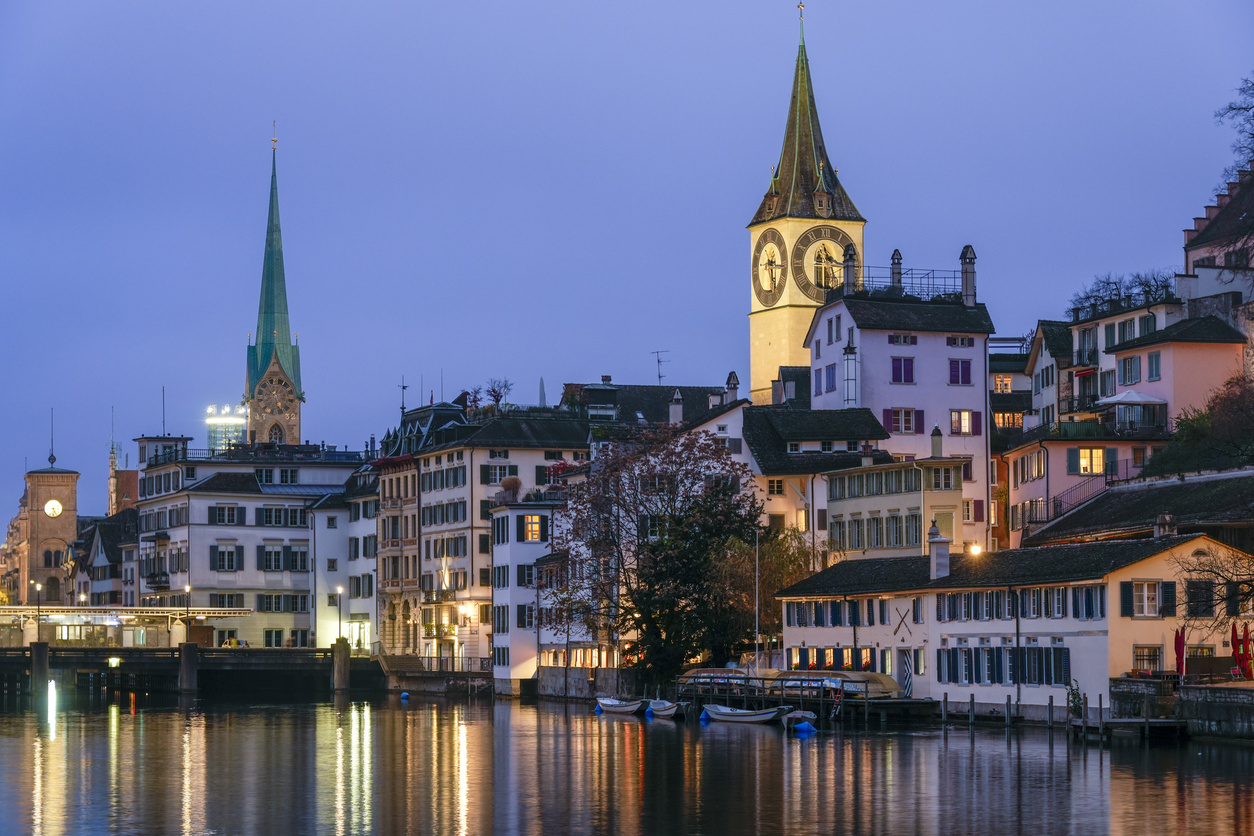How much protest should a democratic state accept?

Roadblocks, sit-ins and attacks on artworks by climate protestors have raised questions about the limits of legitimate action in Switzerland and elsewhere. Judges have not been lenient – should they be?
A dozen people recently sat in a room in Zurich, plotting a crime. They would break into a DIY superstore in the early hours to “borrow” some tools, drive to Paradeplatz square – the heart of the Swiss banking industry – smash through the ground with a jackhammer, and plant a tree. Finally, they would greet the arriving employees of the nearby UBS with information leaflets about climate change and the role of finance in causing it.
The stunt was ambitious. It also wouldn’t happen. The schemers were curious participants at a “non-violent civil disobedience” workshop, run as part of a September conference by left-wing thinktank Denknetz. The workshop, moderated by an Extinction Rebellion and Debt for Climate activist, aimed to show the considerations that go into planning such an operation. Who will drive? How can angry commuters be calmed down? Are you ready for the “emotional rollercoaster” of breaking the law?
And crucially, the moderator asked, are you prepared to face the consequences?
Indeed, as climate-related civil disobedience has spread in recent years, police and courts have responded in kind. A report published last monthExternal link by the Climate Rights International (CRI) group found that across eight Western democracies – Australia, France, Germany, the Netherlands, New Zealand, Sweden, the UK and the US – the official response to protests has been not just harsh but “disproportionate”. A UN report earlier this year came to the same conclusionExternal link.
Coming unstuck in the courtroom
Linda Lakhdhir, legal director at CRI, says state responses can take different forms. Sometimes, she says, police have used excess force to break up protests and arrest activists, but without this leading to serious prosecutions. Elsewhere, in Germany for example, activist groups have been targeted directly; in some parts of the country “Last Generation” has been labelled a criminal organisation.
Finally, Lakhdhir says, some countries have passed new laws carrying heavy penalties for protest activities. In the UK, an activist was sentenced this summer to five years for planning a motorway blockage – an “unprecedented” sentence in the history of climate cases, CRI writes. Overall, Lakhdhir says, even she was surprised by the extent of the repression documented by the report – especially since it is happening in democracies traditionally held up as role models for the respect of fundamental rights.

More
Swiss climate activists continue to protest, but change ‘is not easy’
Human rights law versus criminal law
In Switzerland, the past few years have been littered with cases of civil disobedience, from blocking motorways to playing an impromptu tennis match in a Credit Suisse branch. And while Swiss courts haven’t been as severe as in the UK, the motive of planetary meltdown has been no guarantee of leniency. Rather than seeing the threat of climate change or the freedom of association as mitigating factors, courts have tended to treat cases of disruption as standard criminal affairs, according to a 2023 study by the universities of Bern and Lausanne.
Clémence Demay, co-author of the study, says this largely stems from Swiss judges being unaware or uninterested in the dynamic between criminal law and human rights law in such cases. The European Court of Human Rights (ECHR) has several times set out an argument to justify non-violent action based on the right to free assembly and free speech, she says. But Swiss magistrates, often specifically trained to handle just one type of law, are “not used to taking the human rights aspect into account”.
For activists, this may not mean prison terms – except in rare cases – but it does mean fines and a criminal record.
Graeme Hayes, a professor of sociology at Aston University in Britain, says the gulf between human rights and criminal sentencing is even bigger in the UK. Hayes, who has been following such cases for a decade, says there has been a “chipping away” of protections for non-violent protestors over time. Judges have increasingly used the charge of “public nuisance” to sentence activists, he says – something which wasn’t done in the past. Courts have also started to widen the definition of what counts as “disruptive” or “violent” protest. In September, activists who threw soup over a Van Gogh painting were given jail sentences for “criminal damage”, even though the painting was unharmed.
Hayes says these developments, which are based on legislation introduced in 2022 and 2023, enable courts to side-step the need to consider a defence based on the freedom of expression or speech – and thus to impose harsher sentences. The fact that non-violent protestors are now being jailed is a “huge change”, he adds.
As for what has driven it, he says it is a direct response both to the climate movement and to other disruptive movements such as Black Lives Matter. It’s also based on an attempt to “shrink democratic space” as a way of stifling protest, he says.
Civil disobedience: a debated concept
But what counts as civil disobedience in the first place? Apart from an agreement that it should be non-violent, there’s little consensus on what exactly makes it legitimate. From Henry Thoreau’s 1849 essayExternal link against overbearing government to Hannah Arendt’s focus on civil disobedienceExternal link as a form of collective action, there’s a lot of room for interpretation.
For example: were protestors against Covid-19 measures engaging in civil disobedience? After all, the frequent rallies during the pandemic were attended by people determined to use all means possible to stop a political development they saw as authoritarian. Some might have simply wanted to avoid vaccination; others were opposed to the rollout and consequences of a Covid certificate system.

Demay says the key distinctions lie between whether an action is based on personal motives – which benefit you or your identity group – or on broader motives aiming to change an unjust law or situation. However, “the limit is very political, and it’s also instrumentalised by different groups”, she says.
The tension is also clear in public debates. Surveys, headlines and online comments show that not everyone is ecstatic about their morning commute being blocked by people glued to the road. In Germany last year, an angry lorry driver lashed out at activists and even came close to running them over. In France, the term “eco-terrorists” has been controversially used – including by the interior minister – to refer to climate protestors who clashed with police.
Swiss politicians likewise have little sympathy. While the right speaks of “undemocratic” or “anti-social” behaviour, even the left-wing Greens have tried to distance themselves from the more disruptive protests.
Don’t you have enough rights already?
Meanwhile in the Swiss case the situation is made seemingly more complicated by the country’s system of direct democracy. Here, a typical argument against civil disobedience – including from judges – is that citizens can launch initiatives and referendums. Why not collect signatures rather than stick yourself to a road?
It’s not so simple, activists respond. First, they say, institutions are too slow for what amounts to a climate emergency. Second, voters – not to mention parliament – don’t always opt in favour of the climate anyway.
For her part, Demay reckons this democratic access idea is a “fiction”. Switzerland offers a wide palette of participatory options, she says. But financial factors and the role of interest groups means not everyone has equal access. As such, she says, “civil disobedience has a role to play as an extension of the right to protest, which has always been the most accessible right for those unable to participate in institutional politics”.
In short: “democracy is not perfect, but civil disobedience can help to improve it.”
What’s next for climate protestors?
Demay also reckons things could be shifting in Switzerland. She doesn’t have data for the past year, but has noted various acquittals recently based on human rights arguments. Court reports meanwhile show that some judges are at least open to discussing climate change – even if not enough to drop charges. Other cases are still waiting appeal, including at the ECHR; there, Demay says, the Lausanne tennis activists have a “real chance of winning”.

Elsewhere, Lakhdhir from the CRI is more circumspect. The only major trend she can see across different countries at the moment is that the situation is “inconsistent”. In many cases, climate activists are convicted by one judge before being acquitted by another, or vice versa. She cites a case in Germany where a 65-year-old man got almost two years in prison for taking part in a roadblock, despite having previously been acquitted for a similar action.
Meanwhile, activists themselves are far from positive. On top of a general loss of momentum for the climate movement in recent years, many mention the “chilling effect” – the fear of the physical or psychological consequences of tough repression. Whether this is a factor which deters civil disobedience is disputed; some reckon it could yet spur a more extreme reaction. In Switzerland, at least, the strategy of civil disobedience remains – and will not disappear anytime soon, according to the motorway-blocking Act Now group.
Edited by Mark Livingston, Benjamin von Wyl/ts

In compliance with the JTI standards
More: SWI swissinfo.ch certified by the Journalism Trust Initiative









You can find an overview of ongoing debates with our journalists here . Please join us!
If you want to start a conversation about a topic raised in this article or want to report factual errors, email us at english@swissinfo.ch.